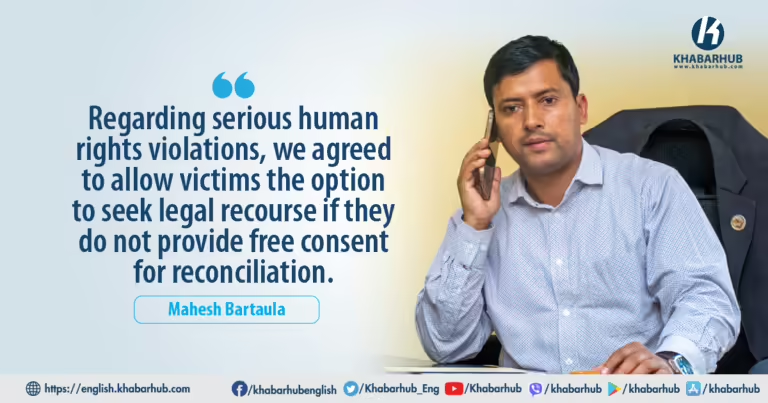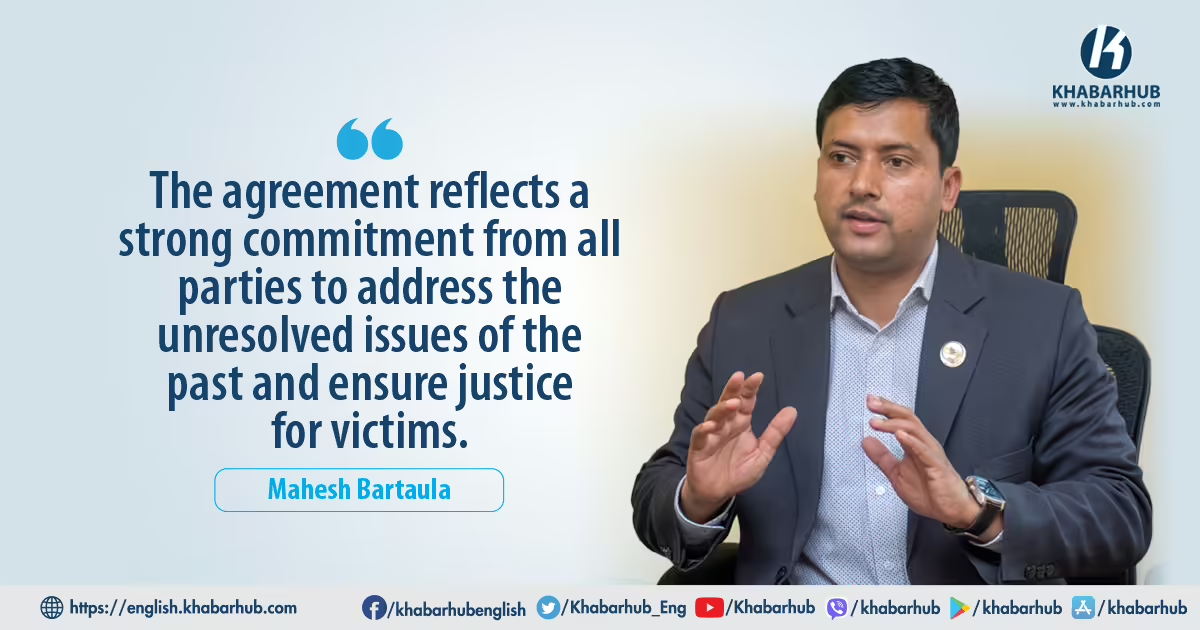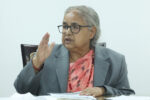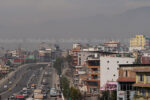KATHMANDU: Eighteen years after the peace agreement between the government and the Maoists, the three major parties reached a consensus on handling incidents of violence from the conflict.
A task force composed of Nepali Congress leader and Home Minister Ramesh Lekhak, Maoist Center leader Janardan Sharma, and CPN-UML leader Mahesh Bartaula resolved key issues surrounding conflict-era incidents.
Bartaula, leader of the UML parliamentary party, informed Khabarhub that the bill on the Truth and Reconciliation Commission (TRC) is awaiting approval in the House of Representatives and is expected to pass in the current parliamentary session.
Following KP Sharma Oli’s appointment as Prime Minister, a task force was formed to address disputes over the TRC bill.
Bartaula noted that the group convened seven times and achieved significant consensus.
“During the previous term, our party chairman KP Sharma Oli made substantial efforts to finalize this matter. He facilitated and coordinated extensively to bring it to a close,” Bartaula told Khabarhub.
According to Bartaula, the TRC bill has been designed with the victims’ needs at its core.
Disagreements on four main issues have been resolved. Once the Law, Human Rights, and Parliamentary Committee drafts its report and briefs the top leaders, the bill is expected to pass in this session.
Bartaula believes that the victim-centric nature of the TRC Bill will garner acceptance from both the victims of the conflict and the international community.
The proposed bill identifies four types of serious human rights violations.
Bartaula stated that after the law is enacted, a commission will be formed to accept complaints for an additional three months.
How was the agreement on the TRC bill reached? Will perpetrators of murder, violence, and looting during the armed conflict face prosecution? Here, Khabarhub spoe to UML leader Bertaula, who worked on the three-party task force, provides detailed insights.
After 18 years of unresolved issues related to transitional justice, the major parties have reached an agreement on the Truth and Reconciliation Commission (TRC) Act. Can you explain how Nepali Congress, CPN-UML, and Maoist Center came to this agreement?
Certainly. The journey to reach this agreement has been long and complex. The Comprehensive Peace Accord (CPA) signed in November 2006, stipulated that justice for victims and accountability for perpetrators should be resolved within six months.
Unfortunately, even after 18 years, these issues remained unresolved.
What were the main obstacles in finalizing the TRC bill?
The main obstacles included several key disputes, including the definition of murder. There was significant debate over how to define murder, particularly in distinguishing between cross-firing and arbitrary killing.
We faced controversy over how to address the families of security personnel who suffered during the armed conflict.
Similarly, there was disagreement on whether victims’ consent was required for reconciliation.
Some believed that victims should have the option to go to court if they did not consent, while others opposed this idea.
Likewise, the issue of reduced sentencing for serious human rights violations was contentious.
We had debates over how much the law could allow for sentence reductions, particularly in severe cases like murder.
What steps were taken to resolve these issues?
We formed a task force consisting of Ramesh Lekhak from the Nepali Congress, Janardan Sharma from the Maoist Center, and myself from the CPN-UML.
We held 6-7 meetings to address these disputes. After extensive discussions, we reached a consensus.
The breakthrough came during our final meeting, where we were able to resolve the outstanding issues and move forward.
What is the current status of the TRC bill?
The bill is now under consideration in Parliament. We have made significant progress and garnered broad support.
It is expected to advance through the legal process with the backing of all major parties.
How do you feel about the outcome?
I am optimistic. The agreement reflects a strong commitment from all parties to address the unresolved issues of the past and ensure justice for victims.
It has been a challenging process, but reaching this agreement is a significant step forward for transitional justice in our country.
Can you elaborate on the specific agreements reached on the four controversial issues discussed regarding the TRC bill?
Certainly. We have clarified that murder will now include both deliberate and arbitrary killings.
This means that any act of killing, whether premeditated or accidental, will be classified under the definition of “murder” in the TRC bill.
Similarly, the issue of minors involved in the conflict was addressed carefully.
We acknowledged that involving minors in war is inherently problematic.
These individuals, who were minors at the time, were classified as “ineligible combatants” after investigation and verification.
Some were armed, some were fighters, and some were integrated into society with substantial financial support.
Many later became prominent figures, including MPs and even the Prime Minister.
The previous government recognized their contributions as “democratic warriors,” but we decided not to use the term “child army” in our discussions.
Instead, the focus is on providing compensation to those who were excluded from the investigation and verification process and did not receive state benefits.

We also agreed to provide a special relief package for the families of security personnel who fought for the nation.
This includes compensation for families of deceased or injured security personnel, acknowledging their contributions and sacrifices during the conflict.
Regarding serious human rights violations, we agreed to allow victims the option to seek legal recourse if they do not provide free consent for reconciliation.
The TRC commission will determine which incidents are classified as serious human rights violations and which are not, ensuring that victims have the opportunity to pursue legal action if they choose.
How do these agreements address the concerns previously raised?
These agreements aim to balance justice and reconciliation by addressing the complex issues surrounding conflict-era violence and its aftermath.
By expanding the definition of murder, acknowledging the unique situation of minors, providing compensation for security personnel, and ensuring victims’ legal recourse, we have made significant strides toward resolving long-standing disputes and delivering a fair and comprehensive approach to transitional justice.
Can you specify which incidents are categorized as serious human rights violations under the new TRC bill?
We have included four specific points as serious human rights violations:
Coercion, murder, disappearance of persons, and cruel torture.
These four types of incidents are now classified as serious human rights violations.
Previously, there were seven categories, but we have narrowed it down to these four, which are also recognized by the international community.
For these cases, the TRC commission will recommend to the Attorney General’s Office to file a case in a special court constituted under this act.
Reconciliation is only possible for cases that do not fall under these categories.
For reconciliation, the victim’s free consent is essential. If the victim does not consent, they retain the right to proceed with legal action.
What is the reconciliation process for cases that do not involve serious human rights violations?
The reconciliation process involves the following steps:
Appeal for Reconciliation: The TRC commission will appeal for reconciliation, giving the victim the freedom to decide whether they want to reconcile.
Proceeding without Consent: If the victim does not consent to reconciliation, and the case is considered governmental (i.e., a serious human rights violation), the TRC commission will recommend that the Attorney General’s Office take necessary legal action.
Civil vs. Criminal Judgments: For cases like confiscation of houses or assets, which are not deemed governmental, the commission can classify them as secular (civil) in nature.
If the victim is unsatisfied with the resolution, the case may also be treated as worldly.
In cases of serious human rights violations, even if reconciliation is not possible, the case will proceed to court.
No Reconciliation for Serious Violations: For the four serious human rights violations—coercion, murder, disappearance, and cruel torture—even if the victim and perpetrator agree to reconciliation, the case will still be filed in court, and the court will adjudicate it.
How is punishment determined for cases involving serious human rights violations?
In cases of serious human rights violations, the Attorney General files for prosecution in a special court, which then determines the punishment.
This differs from normal cases where compensation is the primary focus rather than punishment.
Reduced Sentencing: There was a debate over how much sentencing could be reduced.
Previously, the Attorney General could request a significantly reduced sentence. We have now agreed that the reduction should not be more than 25 percent of the original sentence.
For example, if the punishment for murder is 20 years, the minimum reduction will be 5 years, setting a baseline for the sentence.
Existing Law for Rape: Rape is considered a serious crime and will be handled according to existing laws, not under the reduced sentencing guidelines.
This reflects a commitment to treating rape with the severity it deserves.
What international practices influenced these decisions?
The agreements align with international principles of transitional justice, which suggest lesser punishments for certain crimes like murder and torture as part of reconciliation efforts.
However, we have ensured that these adjustments do not compromise justice for victims or provide undue immunity to perpetrators.
Our goal is to strike a balance between reconciliation and accountability, ensuring that justice is served while also addressing the complexities of transitional justice.
Will the agreement reached by three representatives from the major parties be accepted by everyone involved?
We have made significant progress by completing the political stage of this process.
Our next steps involve institutionalizing this agreement among the top leaders.
The report will be submitted, and the Law, Justice, and Human Rights Committee will review and incorporate the suggestions from the top leaders into their report.
Once this report is finalized and passed by the House, the Truth and Reconciliation Commission will be formed.
The Commission will then identify victims and perpetrators, uncover the truth, and recommend legal action to the Attorney General for serious human rights violations.
For other cases, the commission will handle compensation and advance reconciliation efforts.
What happens if the relevant agencies do not accept the agreement?
This law is designed with the victims at its core. We have adhered to three key principles: international law, the Supreme Court of Nepal’s orders, and a commitment to ensuring maximum justice for victims.
The essence of this Act is to provide victims with access to justice and to hold perpetrators accountable through legal means.
After the Act is passed, a commission will be established with a chairman and five members.
A recommendation committee will select qualified candidates for these positions, and their names will be made public for review.
This process allows for public and victim input, ensuring transparency and accountability.
The Commission will operate impartially. For cases involving reconciliation, if the victim is dissatisfied or does not consent, they still have access to legal remedies.
The law provides for appeals and, in cases of serious human rights violations, the ability to take the case to the Supreme Court.
This ensures that victims are not misrepresented and their interests are prioritized.
How does this new approach address past shortcomings and ensure justice for all affected?
The previous law failed to address several critical issues, including the compensation and recognition of victims.
Our new approach rectifies these shortcomings:
Inclusion of Victims: We have made efforts to include those who were previously overlooked, such as minors involved in the conflict and families of soldiers who fought for the nation. They will now receive the respect and compensation they deserve.
Justice for Victims: We have ensured that justice is provided for those who were killed, maimed, robbed, or disappeared during the conflict.
This is a nationwide issue, not limited to any ruling party or opposition. The goal is to conclude the peace process comprehensively.
In summary, this process is not about political victory or defeat but about achieving a fair and just resolution for all those affected by the conflict.
In concluding the peace process, will there be any contentious issues divisions or unresolved issues like in the past? Is this the final resolution?
We are now at what we consider the final conclusion of this phase.
While it’s unlikely that every single question or issue will be resolved completely, we have made substantial progress.
We estimate that around 60-70% of the issues have been addressed effectively. Our goal is to institutionalize these improvements through the new law and ensure that the commission operates accordingly.
What if there are still issues or concerns that arise after this process?
We have built flexibility into this process. If new issues or concerns emerge that affect the victims’ access to justice, there is a mechanism in place to amend the laws as needed.
The document we are working with allows for future amendments if necessary to improve the system further.
What are the next steps in the legislative process?
Our immediate next step is to submit the report to the relevant committee.
Following this, we will present the full text of the bill to the top leaders for their review.
We aim to advance this through the current Parliament session as per the Prime Minister’s instructions.
Once the committee’s report is finalized, we will take it to the House for approval and passage. This will help us bring the peace process to a conclusion effectively.
How will the peace process proceed now? Will the commission address complaints that were previously not registered, or focus only on new complaints?
The peace process will move forward with a structured approach to handling both new and previously unaddressed complaints. Specifically:
Re-Registration of Complaints: We have allocated a three-month period for re-registering complaints once the commission begins its work.
This is designed to ensure that all victims have the opportunity to bring their grievances forward, even if they were not previously registered.
If there was no complaint filed before, victims will now have the chance to submit their complaints within this timeframe, provided they have evidence to support their claims.
Handling Old Complaints: Complaints that were previously filed and not addressed will also be reviewed by the commission.
The aim is to ensure that no valid complaint is overlooked and to provide maximum justice to the victims.
What happens if a case involves serious human rights violations and reconciliation is not possible?
For cases categorized as serious human rights violations, reconciliation is not an option.
These cases will proceed directly to trial. If the outcome of the trial is unsatisfactory to the victim, they have the right to appeal the case to the Supreme Court.
This process ensures that victims have multiple avenues to seek justice and that serious violations are addressed with the gravity they deserve.









Comment